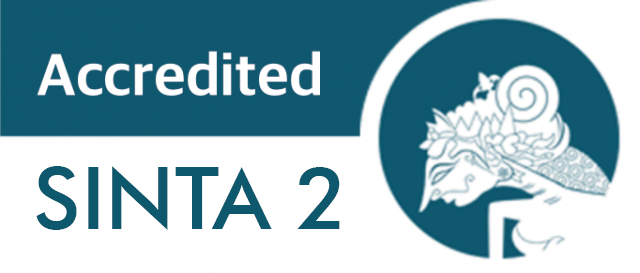Improvement of Metacognitive Thinking Skills in Teacher-Student Scientific Assignments Through the Use of Online Platforms
DOI:
https://doi.org/10.15408/tjems.v9i2.30818Keywords:
scientific problem-solving, online platforms, scaffolding, metacognitive thinking abilities, pemecahan masalah ilmiah, platform online, perancah, kemampuan berpikir metakognitifAbstract
Abstract
Scientific problem-solving, starting with simple tasks and growing in difficulty until reaching the task with the climax level of difficulty, can be used as a training tool for developing metacognitive thinking abilities. Teachers and lecturers can make the most of scaffolding from online platforms by demonstrating how to complete a task in a systematic way. This study uses a participatory action research/PAR design with a class of students from the Islamic Religious Education study program at the University of Muhammadiyah Jakarta to examine how students learn metacognitive thinking abilities from completing scientific assignments in research methods courses employing interviews, documents, and observation to gather data. One of the study's most significant findings is that lecturers can use a number of strategies to help students develop their metacognitive thinking skills. These strategies are as follows: 1) Students can be trained in learning metacognitive thinking skills as early as the first semester through English resources introduced by lecturers from reputable online search engines; 2) Lecturers can offer a focus on research methodology assignments that require students to access various online platforms in their work; 3) It is recommended that research methodology courses be spread out in the early, middle, and final semesters; 4) Lecturers can improve the metacognitive thinking skills and self-efficacy of more advanced students by using various approaches, strategies and learning resources. If necessary, a reward and punishment system can be applied, especially to motivate male students and students who lack discipline.
Abstrak
Pemecahan masalah ilmiah, mulai dari tugas-tugas sederhana dan berkembang dalam tingkat kesulitan hingga mencapai tugas dengan tingkat kesulitan klimaks, dapat digunakan sebagai sarana latihan untuk mengembangkan kemampuan berpikir metakognitif. Guru dan dosen dapat memanfaatkan scaffolding dari platform online dengan mendemonstrasikan cara menyelesaikan tugas secara sistematis. Penelitian ini menggunakan desain penelitian tindakan/PAR partisipatif dengan melibatkan sekelompok mahasiswa program studi Pendidikan Agama Islam Universitas Muhammadiyah Jakarta untuk mengkaji bagaimana mahasiswa mempelajari kemampuan berpikir metakognitif dari menyelesaikan tugas ilmiah dalam mata kuliah metode penelitian dengan menggunakan wawancara, dokumen, dan observasi untuk mengumpulkan data. Salah satu temuan studi yang paling signifikan adalah bahwa dosen dapat menggunakan sejumlah strategi untuk membantu mahasiswa mengembangkan kemampuan berpikir metakognitif mereka. Strategi-strategi tersebut adalah sebagai berikut: 1) Mahasiswa dapat dilatih untuk mempelajari keterampilan berpikir metakognitif sejak semester pertama melalui sumber bahasa Inggris yang diperkenalkan oleh dosen dari mesin pencari online; 2) Dosen menawarkan fokus pada tugas metodologi penelitian yang mengharuskan mahasiswa untuk mengakses berbagai platform online dalam pekerjaannya; 3) Disarankan mata kuliah metodologi penelitian disebarluaskan pada semester awal, tengah, dan akhir; 4) Dosen dapat meningkatkan kemampuan berpikir metakognitif dan efikasi diri mahasiswa yang lebih maju dengan menggunakan berbagai pendekatan, strategi dan sumber belajar. Jika perlu dapat diterapkan sistem reward and punishment terutama untuk memotivasi siswa laki-laki dan siswa yang kurang disiplin.
How to Cite : Hermawan, C. M., Rosfiani, O., Hassan, S. A, Kuswiyanti, T. S., Sudin, M., Roswati, S. (2022). Improvement of Metacognitive Thinking Skills in Teacher-Student Scientific Assignments Through the Use of Online Platforms. TARBIYA: Journal of Education in Muslim Society, 9(2), 190-197. doi:10.15408/tjems.v9i2. 30818.
References
Adadan, E., & Oner, D. (2018). Examining preservice teachers’ reflective thinking skills in the context of web-based portfolios: The role of metacognitive awareness. Australian Journal of Teacher Education, 43(11), 26–50. https://doi.org/10.14221/ajte.2018v43n11.2
Adiansyah, R., Corebima, A. D., Zubaidah, S., Rohman, F. (2021). The correlation between metacognitive skills and scientific attitudes towards the retention of male and female students in South Sulawesi, Indonesia. International Journal of Evaluation and Research in Education (IJERE), 10(4), 1272–1281. https://doi.org/10.11591/ijere.v10i4.21597
Akbayir, K., & Topçul, I. (2021). The effect of middle school students' metacognitive awareness and logical thinking skills on success in Mathematics course. Education Quarterly Reviews, 4(1). https://doi.org/10.31014/aior.1993.04.02.272
Akyüz, H. İ., Samsa Yetik, S., & Keser, H. (2015). Effects of metacognitive guidance on critical thinking disposition. Pegem Eğitim ve Öğretim Dergisi, 5(2), 133–148. https://doi.org/10.14527/pegegog.2015.007
Antonio, R. P. (2020). Developing students’ reflective thinking skills in a metacognitive and argument-driven learning environment. International Journal of Research in Education and Science, 6(3), 467–483. https://doi.org/10.46328/ijres.v1i1.1096
Antonio, R. P. (2020). Developing students’ reflective thinking skills in a metacognitive and argument-driven learning environment developing students’ reflective thinking skills in a metacognitive and argument-driven learning environment. International Journal of Research in Education and Science (IJRES), 6(3), 467-483.
Azmy, K. A. Al, & Alebous, T. M. (2020). The degree of using meta-cognitive thinking strategies skills for problem-solving by a sample of Biology female teachers at the secondary stage in the State of Kuwait. Educational Research and Reviews, 15(12), 764–774. https://doi.org/10.5897/ERR2020.4094 coşkun2018.pdf. (n.d.).
de Jager, T. (2019). Impact of e-portfolios on science student-teachers reflective metacognitive learning and the development of higher-order thinking skills. Journal of University Teaching and Learning Practice, 16(3).
Fauzi, K. M. A., Dirgeyase, I. W., & Priyatno, A. (2019). Building learning path of Mathematical creative thinking of junior students on Geometry topics by implementing a metacognitive approach. International Education Studies, 12(2), 57. https://doi.org/10.5539/ies.v12n2p57
Gotoh, Y. (2017). Development of critical thinking with metacognitive regulation and Toulmin model. 14th International Conference on Cognition and Exploratory Learning in the Digital Age, CELDA 2017, Celda, 281–285.
Han, I. (2021). Comprehension of experienced English language teachers’ professional identity and related metacognitive thinking procedures. Teachers and Teaching, 00(00), 1–23. https://doi.org/10.1080/13540602.2021.1939002
Hashmi, A., Khalid, M., & Shoaib, A. (2019). A cross-sectional study of assessing metacognitive knowledge and metacognitive regulatory skills among prospective teachers and its relation to their academic achievement. Bulletin of Education and Research, 41(2), 215–234.
Hermawan, C. M., Rosfiani, O., Syamsudin, Zulfikar, Y., & Daffa, T. M. (2022). Coaching untuk guru membuat modul ajar dan melaksanakan pembelajaran proyek untuk meningkatkan keterampilan abad ke-21 dan keterampilan literasi murid. Kawanad: Jurnal Pengabdian Kepada Masyarakat, 1(2), 170-180. https://journal.kawanad.com/index.php/kjpkm/article/view/87/55
Hostetler, K., Luo, T., & Stefaniak, J. E. (2018). Aligning information literacy assessment with metacognitive strategies. Journal of University Teaching and Learning Practice, 15(5).
Kavousi, S., Miller, P. A., & Alexander, P. A. (2020). Modeling metacognition in design thinking and design making. International Journal of Technology and Design Education, 30(4), 709–735. https://doi.org/10.1007/s10798-019-09521-9
Kozikoğlu, İ. (2019). Investigating critical thinking in prospective teachers: Metacognitive skills, problem-solving skills, and academic self-efficacy. In Journal of Social Studies Education Research (Vol. 10, Issue 2, pp. 111–130).
Muhali, Yuanita, L., & Ibrahim, M. (2019). The validity and effectiveness of the reflective-metacognitive learning model in improving students’ metacognitive ability in Indonesia. Malaysian Journal of Learning and Instruction, 16(2), 33–74. https://doi.org/10.32890/mjli2019.16.2.2
Pantiwati, Y., & Husamah. (2017). Self and peer assessments in active learning model to increase metacognitive awareness and cognitive abilities. International Journal of Instruction, 10(4), 185–202. https://doi.org/10.12973/iji.2017.10411a
Rosfiani, O., Hermawan, C. M., & Sutisnawati, A. (2022). Developing 21st century skills and literacy skills for elementary school students through constructivist-based planning and assessment of critical engagement models. In The Sixth International Conference on Language, Literature, Culture, and Education (The 6th ICOLLITE). 414-421. https://www.atlantis-press.com/proceedings/icollite-22/125982940
Rosfiani, O., Kuswiyanti, T. S., & Abdultawab, M. M. (2021). Teacher-students’ critical literacy in the academic environment. Tarbiya: Journal of Education in Muslim Society, 8(2). https://journal.uinjkt.ac.id/index.php/tarbiya/article/view/24095
Smith, A. K., Black, S., & Hooper, L. M. (2020). Metacognitive knowledge, skills, and awareness: A possible solution to enhancing academic achievement in African American Adolescents. Urban Education, 55(4), 625–639. https://doi.org/10.1177/0042085917714511
Sutisnawati, A., Rosfiani, O., Hermawan, C. M., Fahrezi, M. I., Azie, I., Wahyuni, S., Mardiyah, A., & Kamila, A. (2022). Penerapan model pembelajaran konstruktivis berbasis proyek untuk meningkatkan keterampilan literasi siswa kelas V Sekolah Dasar. Jurnal Cakrawala Pendas, 8(4). https://ejournal.unma.ac.id/index.php/cp/article/view/3326/2163
Teng, F. (2020). Tertiary-level students’ English writing performance and metacognitive awareness: A group metacognitive support perspective. Scandinavian Journal of Educational Research, 64(4), 551–568. https://doi.org/10.1080/00313831.2019.1595712
Thienngam, S., Promlek, A., & Thongsaard, K. (2020). Influence of teachers’ metacognitive skills on the development of early-childhood students. Australian Journal of Teacher Education, 45(1), 19–30. https://doi.org/10.14221/ajte.2020v45n1.2
Toraman, Ç., Orakcı, Ş., & Aktan, O. (2020). Analysis of the relationships between mathematics achievement, reflective thinking of problem-solving, and metacognitive awareness. International Journal of Progressive Education, 16(2), 72–90. https://doi.org/10.29329/ijpe.2020.241.6
University, G. M. (2011). Development of critical thinking rubric. 13 International Conference on Cognition and Exploratory Learning in Digital Age (CELDA 2016), Celda, 2010–2012. http://iaesjournal.com/online/index.php/IJERE











